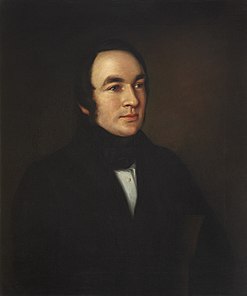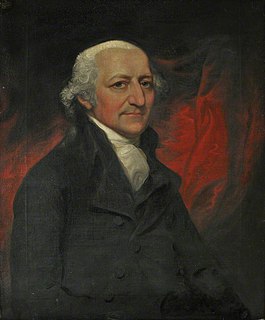Related Research Articles

Henry Baker was a British naturalist.

Jacob Bryant (1715–1804) was an English scholar and mythographer, who has been described as "the outstanding figure among the mythagogues who flourished in the late eighteenth and early nineteenth centuries."

William Henry was an English chemist. He was the son of Thomas Henry and was born in Manchester England. He developed what is known today as Henry's Law.

William Thomas Brande FRS FRSE was an English chemist.

Henry Warburton was an English merchant and politician, and also an enthusiastic amateur scientist.

George Butler was an English schoolmaster and divine, Headmaster of Harrow School from 1805 to 1829 and Dean of Peterborough from 1842 to his death in 1853.

Admiral Lord Amelius Beauclerk was a Royal Navy officer.

Admiral Sir Charles Rowley was a Royal Navy officer who went on to be Commander-in-Chief, Portsmouth.

The Warburton Lectures are a series of theology lectures held in Lincoln’s Inn, London. They were established in 1768 with money given by William Warburton, and were intended to bring young divines to the notice of London audiences. The set topic was the proof of Christianity through prophecies.
Henry Stebbing (1687–1763) was an English churchman and controversialist, who became archdeacon of Wilts.
Thomas Rutherforth (1712–1771) was an English churchman and academic, Regius Professor of Divinity at Cambridge from 1745, and Archdeacon of Essex from 1752.

John Ord (1729–1814) was an English barrister and politician who sat in the House of Commons from 1774 to 1790.

John Reid was a Scottish physician and academic, known as an anatomist and physiologist.
Jan van Rymsdyk was a Dutch painter and engraver.

John Lewis Petit (1736–1780) was an English physician and Fellow of the Royal Society.
References
- ↑ "Fellows of the Royal Society". London: Royal Society. Archived from the original on 16 March 2015.
- ↑ Stephen, Leslie, ed. (1886). . Dictionary of National Biography . 6. London: Smith, Elder & Co.
- ↑ Lee, Sidney, ed. (1891). . Dictionary of National Biography . 26. London: Smith, Elder & Co.
- ↑ "John Rowley". Oxford Dictionary of National Biography (online ed.). Oxford University Press. doi:10.1093/ref:odnb/24223.(Subscription or UK public library membership required.)
- ↑ "Warburton, Henry (WRBN802H)". A Cambridge Alumni Database. University of Cambridge.
- ↑ O'Byrne, William Richard (1849). . A Naval Biographical Dictionary . John Murray – via Wikisource.